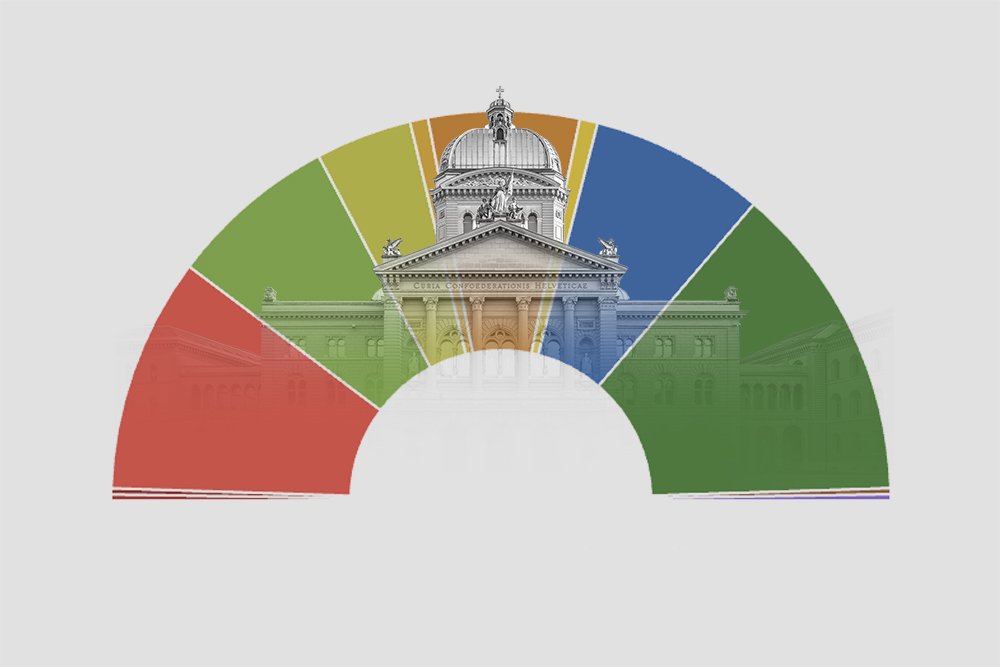Foreign media bemoans Swiss electoral shift to right

Switzerland has become the latest European country to embrace right-wing populism at the ballot box, according to several editorials in the international media.
On Sunday, the right-wing Swiss People’s Party gained three percent more votes compared to the last general election in 2019 to increase their standing as the largest political party with 28.6% share of the vote. The biggest losers were the two Green parties that both lost seats in the new parliament.
+ Swiss parliament shifts to the right
“The elections confirm a resurgence of populists at the ballot box across Europe,” says the Financial Times, which is among a number of media outlets to point to a shift to the right in several other countries, such as Italy, Austria, Germany and Finland.
“As a result of the corona pandemic and the geopolitical upheavals, climate protection has again taken a back seat in the public’s consciousness. In these politically and economically uncertain times, more Swiss people have turned to conservative forces again,” notes the Frankfurter Allgemeine Zeitung in Germany.
Several articles suggest that the Ukraine war and renewed violence in the Middle East may have persuaded voters to take a more defensive stance against perceived outside threats.
Controversial campaign
The French newspaper Le Monde says the Swiss People’s Party took full advantage during its election campaign, which “focused on its favorite theme: the fight against ‘mass immigration’ and the prospect of the Swiss population reaching 10 million. Its ‘New normal?’ social media adverts, spotlighting crimes perpetrated by foreigners, plunged into a world of bloodied knives, hooded criminals, fists, bruised faces and frightened women.”

More
Elections 2023: results
Germany’s Die Zeit newspaper summarises the election campaign as: “The hit-the-foreigner card was played”.
The Süddeutsche Zeitung scathingly reports that “Switzerland is isolating itself”. The commentary goes on to say: “War in Ukraine, war in the Middle East…many voters prefer to close their eye and vote for the People’s Party to comfortably wrap themselves in even more neutrality.”
CNBC said voters in Switzerland, like other parts of Europe, have made their choice between conflicting issues.
“The Swiss vote showed another slice of the European electorate thinking about how to balance the appeal of right-wing populist politics and the need to spend money and resources to fight global warming at a time of rising inflation that has pinched many pocketbooks — even in well-to-do Switzerland.”
Greens fail
“The great shadow that has fallen across the world has also reached Switzerland,” is how the the Swiss Neue Zürcher Zeitung newspaper sums up Sunday’s vote. “The world is burning and there is great uncertainty: parties that demand something from citizens are not in demand. Those who promise security win – even if it’s a false promise.”
“Liberalism is emerging from these elections weakened, and personal responsibility counts less than ever.”
However, much of the Swiss media paints a more nuanced picture, pointing out that the election did not result in a landslide for the right. And – unlike in 2015 – the Swiss People’s Party does not have a majority in the House of representatives. The left-wing Social Democrats and the Centre Party also both made gains on Sunday.
But there is universal condemnation for the Green party and Green Liberals, whose campaigns led to serious losses. Climate politics has called for far too many sacrifices from people while failing to deliver concrete plans that could be accepted by voters.
“The Greens’ doomsday alarmism looks to have worn off, while their constant calls for change have had a deterrent effect,” says the Tages Anzeiger.
“By lecturing everyone, the Greens have lost their way,” states the Tribune de Genève.

More
Eight takeaways from the 2023 federal elections in Switzerland

In compliance with the JTI standards
More: SWI swissinfo.ch certified by the Journalism Trust Initiative











You can find an overview of ongoing debates with our journalists here . Please join us!
If you want to start a conversation about a topic raised in this article or want to report factual errors, email us at english@swissinfo.ch.